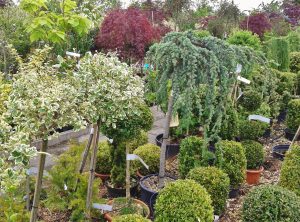Sunday hunting is prohibited on all State Forest property More Info
 Plant Industries inspectors look for insect and plant disease pests on nursery stock. The Delaware Department of Agriculture’s Nursery section is responsible for the administration of the Delaware Nursery Law (Title 3 Chapter 13 – Nurseries and Nursery Stock Law). Delaware law defines nursery stock as “any plant for planting, propagation, or ornamentation, including, but not limited to:
Plant Industries inspectors look for insect and plant disease pests on nursery stock. The Delaware Department of Agriculture’s Nursery section is responsible for the administration of the Delaware Nursery Law (Title 3 Chapter 13 – Nurseries and Nursery Stock Law). Delaware law defines nursery stock as “any plant for planting, propagation, or ornamentation, including, but not limited to:
a. All plants, trees, shrubs, vines, perennials grafts, cuttings and buds that may be sold for propagation, whether cultivated or wild, and all viable parts of these plants.
b. Any other plant or plant part, including cut Christmas trees or any non-hardy plant or plant part, including but not limited to, annuals, bedding plants and vegetable plants.”
In addition, the Nursery section issues certificates of inspection, phytosanitary certificates, and Nursery Licenses to businesses engaged in a nursery or nursery-related business within the state. Certification and inspections are conducted to prevent the introduction of unwanted plant pests into Delaware and facilitate grower shipments of nursery stock to other states and countries.
Anyone directly engaged with the distribution of plants, plant products, plant material, nursery stock, or horticultural products is required to let the Delaware Department of Agriculture know that they are conducting this business. They must obtain a nursery industry license before starting business operations. The nursery industry licenses are valid for one year (January 1 – December 31) and must be renewed annually.
Citizens wishing to search for a nursery in their county may utilize this online directory:
Video 1: What Does the Invasive Plant Law Mean for Me?
The Invasive Plants Law went into effect on July 1, 2022, prohibiting any person from importing, exporting, buying, selling, transporting, distributing, or propagating any viable portion, including seeds, of an invasive plant in Delaware. An invasive plant includes any living part, cultivar, species, or subspecies not native to Delaware that has the potential to result in widespread dispersal and establishment; out-compete other species in the same area; exhibit rapid growth or high seed or propagule productions; or become established in natural areas in the State.
If an individual or group is interested in obtaining an exemption for a cultivar from the Invasive Plant List, the Petition to Exempt Cultivar NEW! must be completed and submitted for review.
Video 2: What is an Invasive Plant?
Video 3: The Benefits of Planting Native Plants
Video 4: Tips to Attract Pollinators
Updated 806 Regulations for Invasive Plants, including the Final Invasive Plant List in the Invasive Species Law, was published in Vol. 26, Issue 3, Thursday, September 1, 2022:
(asterisk indicates potentially sold in the nursery trade.)
¹ The following three cultivars of Japanese barberry are exempt from the Invasive Plant List:
Plants listed on the Plant Watch List must be identified with a tag, label, or sign on each plant or in the general vicinity of the plants for sale. (Effective August 15, 2022)
Delaware Native Plants for Native Bees
Controlling Backyard Invaders
University of Delaware Plants for Delaware Landscapes
DNREC Native Indigenous Trees of Delaware
USDA PLANTS Database (Plant List of Attributes, Names, Taxonomy, and Symbols)
Delaware Ribes Permit Application
Delaware Business Spotted Lanternfly Permit Registration and Testing
Rebecca Gartley, Environmental Scientist I
Business Phone: 302-698-4589
Related Topics: Listings, Nursery Inspection, Nursery License, Nursery Staff, plant industries, Rebecca Gartley